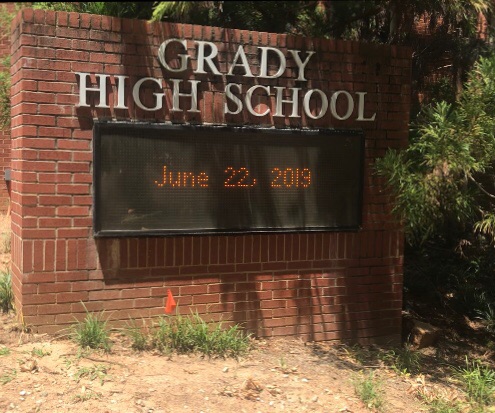Place-based name ‘most relevant for past, present and future students’
November 16, 2020
| Dear The Southerner,
I have a child enrolled in the Grady cluster and live in Old Fourth Ward. I started the petition urging the Atlanta Board of Education to vote no on the recommendation to rename Henry W. Grady High School after Ida B. Wells. The petition garnered almost 2,000 signers. I continue to believe that a place-based name is the best option, and this letter will highlight why. A place-based name is most relevant for past, present and future students of Grady High School. Over 20,000 alumni have passed through the halls of Grady since its earliest iteration over a century ago. The diverse neighborhoods zoned for this school comprise a broad cross-section of Atlanta’s history, its present and potential. One of the main common threads now and into the future is the school’s location. Selecting a place-based name will uplift something all alumni and current/future students share – where they went physically went to school. Some alumni have said they feel erased by and excluded from the name-change process, because they established a new legacy of their own for the Grady name and imbued it with new meaning. Retaining the Grady name is not a voting option at this time, but a place-based name could help to maintain those alumni connections, linking those who went before with current students and those who will follow. A place-based name offers the best chance to pull the community together. Before moving to Old Fourth Ward, I researched Grady High School and learned about how there were supposedly “Two Gradys,” a bifurcated school on the same campus. How unfortunate. However, there is real work that is being done and that needs to continue to bring this school community together and make all students and stakeholders feel welcomed, included and valued. Renaming Grady High after Ida B. Wells would not advance this unifying and inclusive work. Her name would be a venerated, but disconnected counterpoint to the problematic views of Henry W. Grady. Renaming the school after Wells would be divisive for an already fractured community, and that’s just not what we need in 2020. In addition, the majority of the student votes that were cast previously favored a place-based name. The proposed name of Ida B. Wells does not represent the will of the whole student body. Wells’ name was put forward by a handful of students on The Southerner staff, and The Southerner endorsed that name. A handful of students pre-empted broad student body engagement in the name change process. (See Grady teacher, Mario Herrera’s September 3rd letter to the editor). The Southerner staff held itself out as the voice for all students, which is not the case. The Southerner has appeared extremely biased on this issue and recently reiterated its editorial policy that the views of its staff don’t necessarily represent the views of Grady’s students, staff, etc. That seems like backpedaling. This week, Grady students have another opportunity to vote for a new name of Grady High School, and I hope they will do so in consideration of which name will maintain connections with alumni and stakeholders, which name can help bring us together and which name will offer the best opportunity for there to be “one high school” for this cluster. I believe a place-based name can do that. Sincerely, |







Erika Gonzalez • Nov 16, 2020 at 9:44 am
In my opinion one of the ways we need to counteract the negatives of our racist history is to hold up more black women and men as role models in our society. While a place-based name is certainly neutral, now is not the time for neutrality. Neutrality can come when we achieve true equality of opportunity and success. Until then, we need to work on righting some of the wrongs of our past. One way to do this is to honor a black woman so that our children see role models of color venerated.
One of the most compelling things I have heard from folks traveling to certain countries in Africa is how amazing it was to walk around and see statues and memorials to people who look like themselves. We need to be offering this to our children here. This is an opportunity to do this. I hope that moving to ‘voting’ again does not allow a majority of white participants to prioritize neutrality without taking on the hard work of being advocates for overcoming our collective past.
Erika Gonzalez
Grady parent